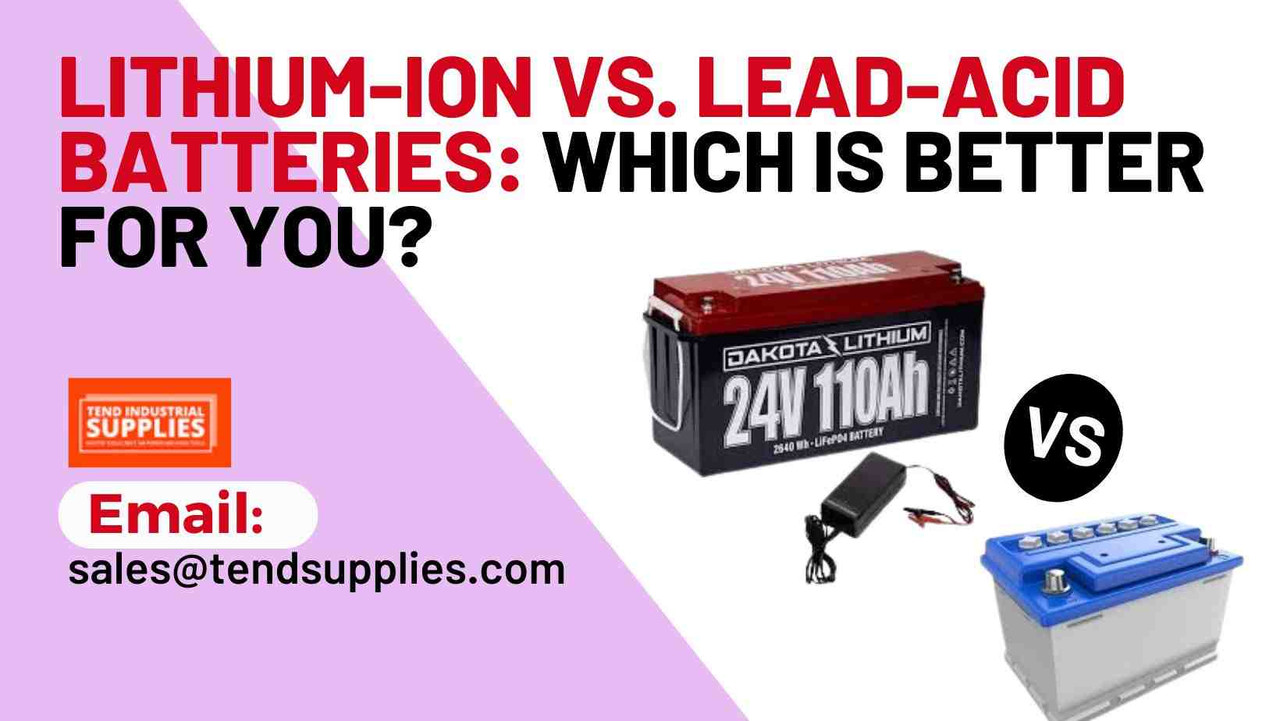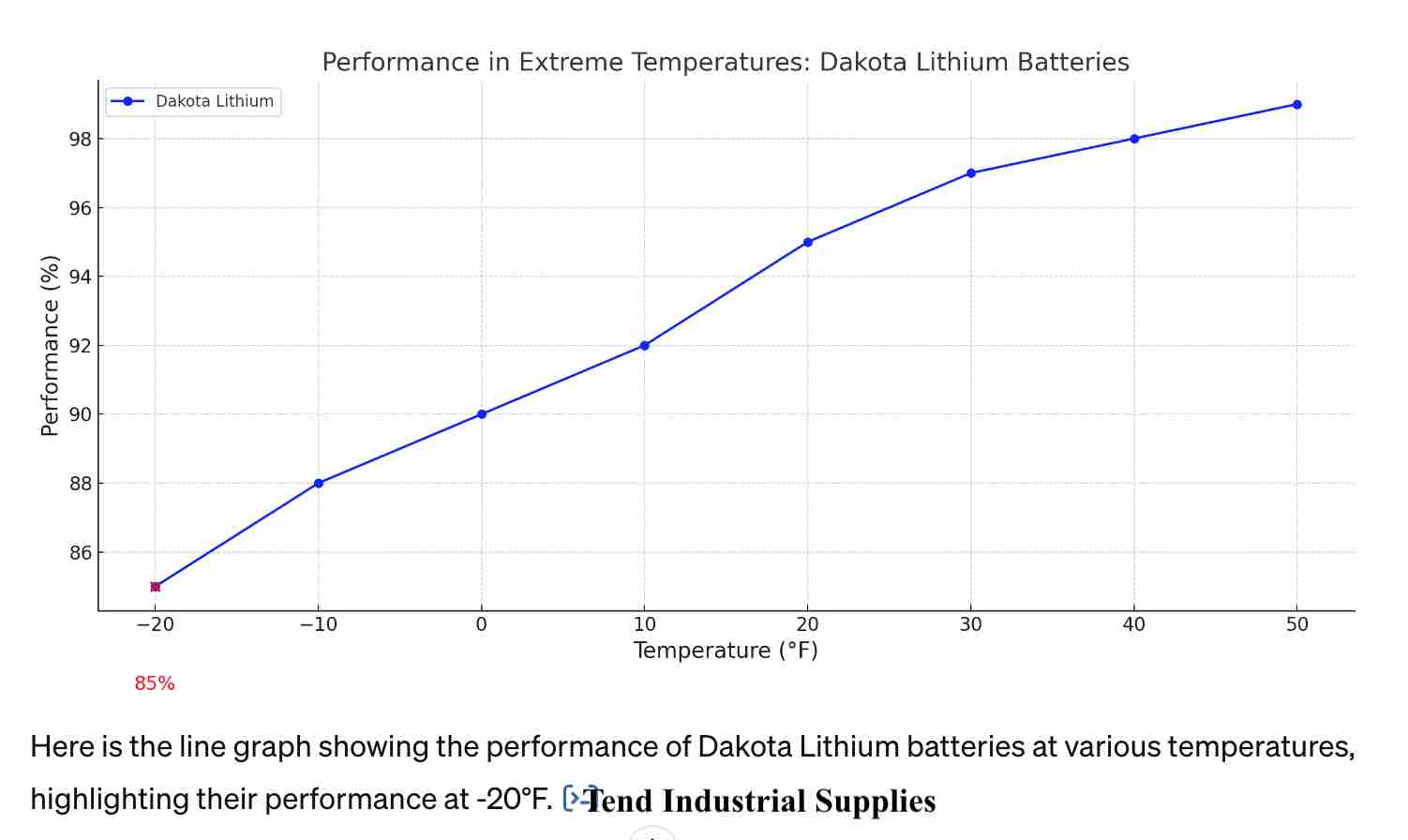Lithium-Ion vs. Lead-Acid Batteries: Which Is Better for You?
Understanding the differences between lithium-ion and lead-acid batteries is crucial when choosing the correct battery for your needs. This comprehensive guide will compare both battery types' technical and practical aspects, focusing on why Dakota Lithium batteries stand out as a superior choice. We will cover the benefits, applications, and critical performance metrics to help you make an informed decision.
Key Takeaway
Dakota Lithium batteries offer a superior alternative to traditional lead-acid batteries, providing higher energy density, longer lifespan, faster charging, and lower maintenance. Their versatility, safety features, and environmental friendliness make them an excellent choice for various applications.
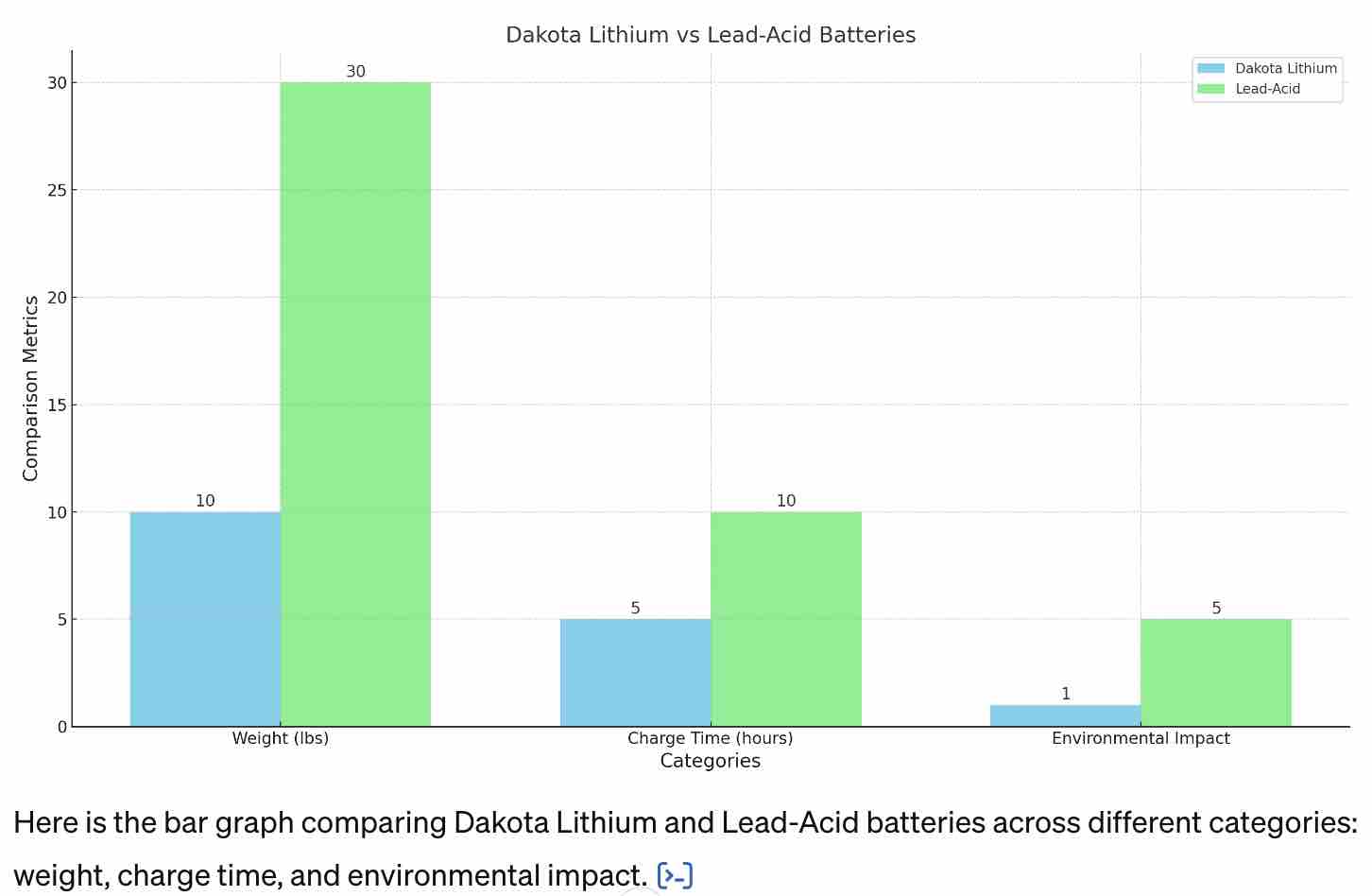
Introduction
Batteries are the heart of many modern technologies, powering everything from vehicles to renewable energy systems. Two of the most common types of batteries are lithium-ion and lead-acid batteries. Each has its strengths and weaknesses; the best choice depends on your specific needs and applications.
Understanding Lithium-Ion Batteries
What Are Lithium-Ion Batteries?
Lithium-ion (Li-ion) batteries are rechargeable batteries that use lithium ions as the primary component of their electrochemistry. They are known for their high energy density, long cycle life, and lightweight construction. Dakota Lithium batteries, a type of lithium iron phosphate (LiFePO4) battery, are popular due to their enhanced safety and performance characteristics.
Key Features of Lithium-Ion Batteries
- High Energy Density: Lithium-ion batteries can store much energy in a relatively small and lightweight package, making them ideal for portable and space-constrained applications.
- Long Cycle Life: These batteries can be charged and discharged without significant degradation. Dakota Lithium batteries, for example, can last up to 2,000+ cycles.
- Fast Charging: Lithium-ion batteries can be charged quickly, a significant advantage in applications where downtime needs to be minimized.
- Low Self-Discharge: They have a low rate, meaning they retain their charge longer when not in use.
- Environmental Friendliness: Lithium-ion batteries are more environmentally friendly than lead-acid batteries, as they contain fewer toxic materials and are more recyclable.
Understanding Lead-Acid Batteries
What Are Lead-Acid Batteries?
Lead-acid batteries are one of the oldest and most widely used rechargeable batteries. They are commonly found in automotive applications, uninterruptible power supplies (UPS), and other stationary applications.
Key Features of Lead-Acid Batteries
- Cost-Effective: Lead-acid batteries are generally cheaper upfront compared to lithium-ion batteries.
- Proven Technology: They have been used for over a century and are well understood, with a reliable performance history.
- High Surge Currents: Lead-acid batteries can provide high surge currents, which is useful for applications requiring a large amount of power for a short period.
- Availability: They are widely available and come in various sizes and capacities to suit different needs.
Comparative Analysis: Lithium-Ion vs. Lead-Acid Batteries
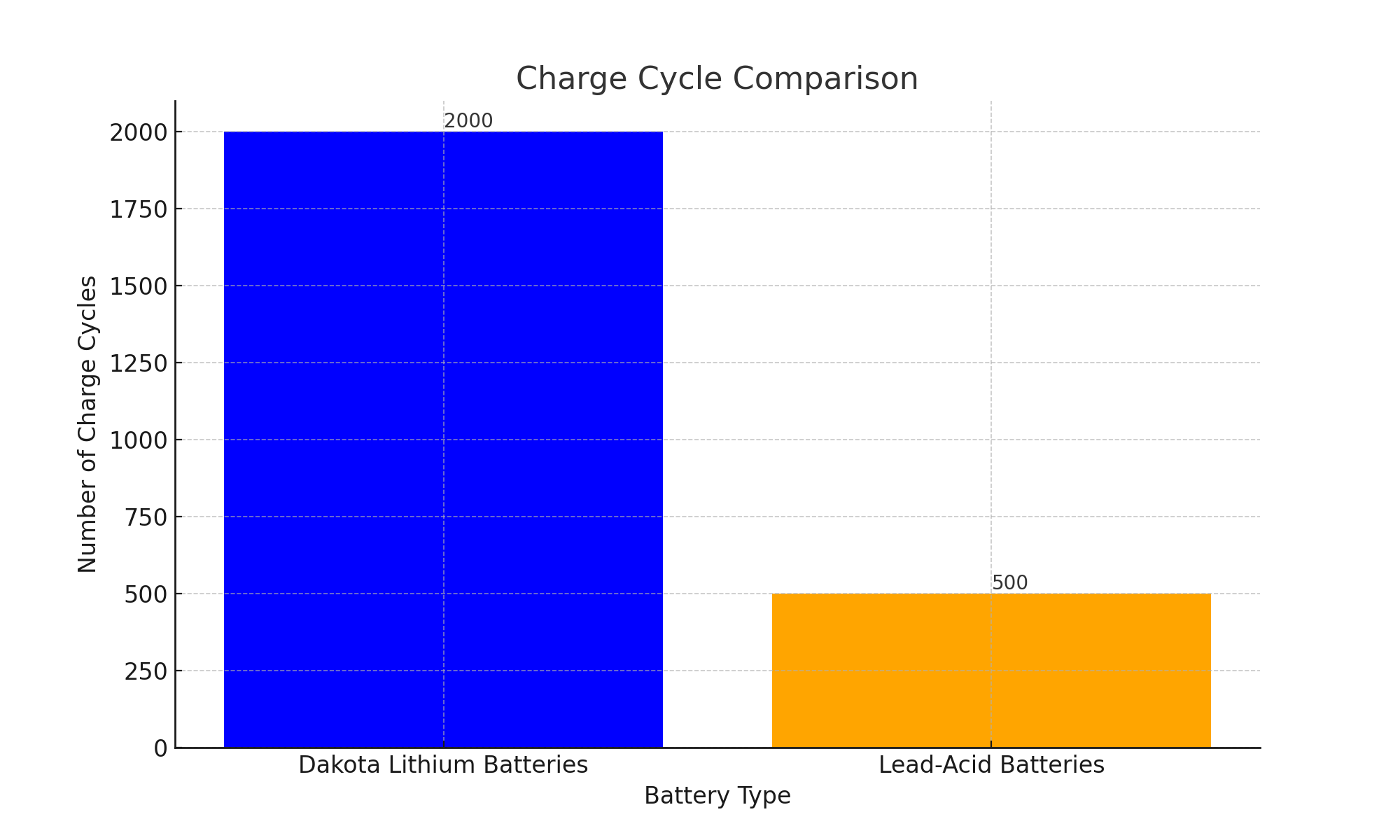
Energy Density
Lithium-ion batteries have a significantly higher energy density than lead-acid batteries. This means they can store more energy in a smaller, lighter package. For example, a Dakota Lithium battery provides up to 3 times the energy density of a traditional lead-acid battery, making it ideal for applications where weight and space are critical.
Lifespan and Cycle Life
One of the most significant advantages of lithium-ion batteries is their lifespan and cycle life. While lead-acid batteries typically last between 500 to 1,000 cycles, Dakota Lithium batteries can last 2,000+ cycles under recommended conditions. This extended lifespan translates to lower total cost of ownership over time, despite the higher initial cost.
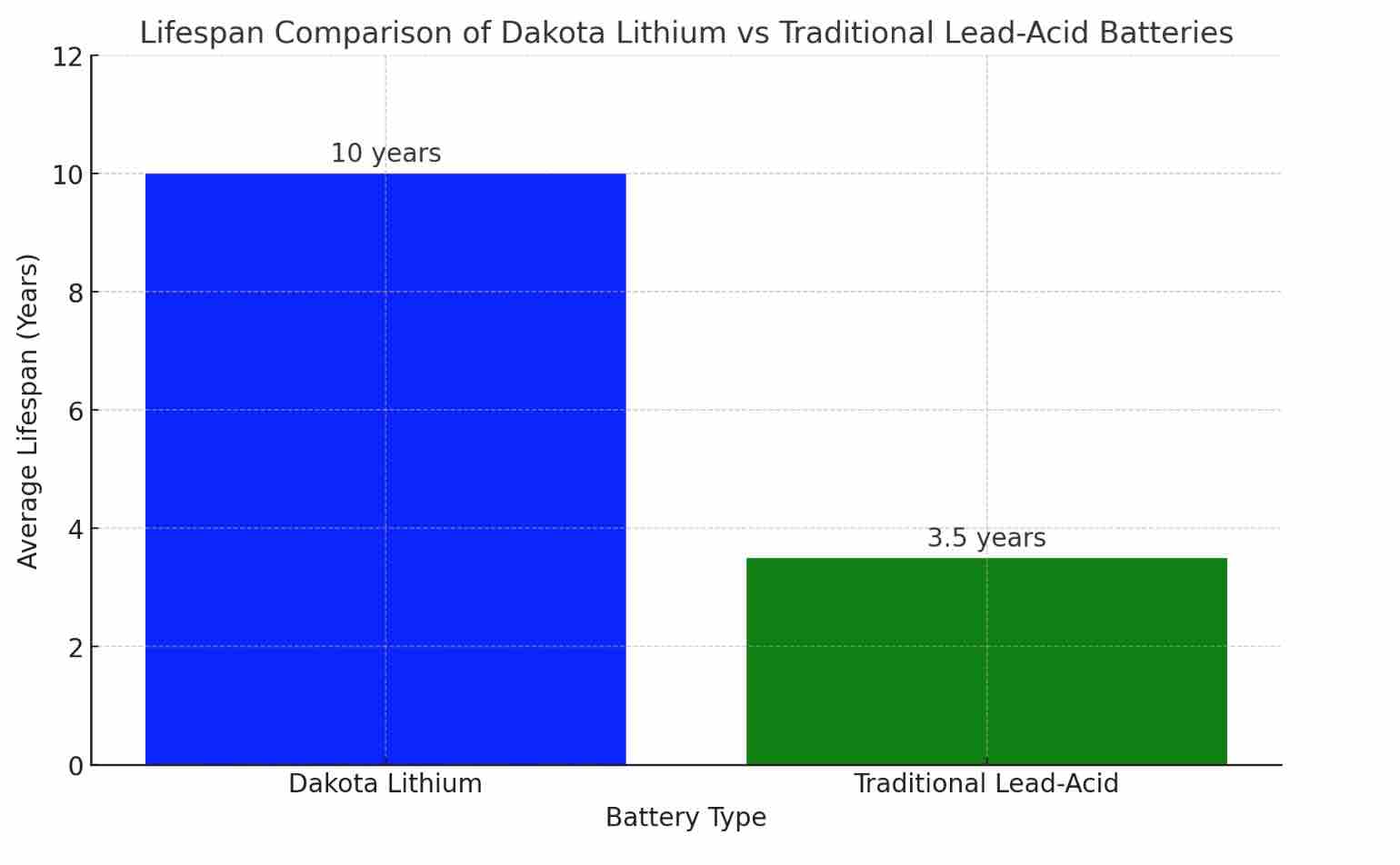
Charging Efficiency
Lithium-ion batteries charge much faster than lead-acid batteries. They can be charged to full capacity in a fraction of the time required for lead-acid batteries. Additionally, lithium-ion batteries have a higher charge efficiency, meaning less energy is lost during the charging process.
Weight and Size
Lithium-ion batteries are much lighter and more compact than lead-acid batteries. This makes them an excellent choice for applications where weight and space are at a premium, such as in electric vehicles, portable devices, and marine applications.
Maintenance Requirements
Lead-acid batteries require regular maintenance to ensure optimal performance, including checking electrolyte levels and cleaning terminals. In contrast, lithium-ion batteries are virtually maintenance-free, reducing the hassle and cost associated with upkeep.
Environmental Impact
Lithium-ion batteries are more environmentally friendly than lead-acid batteries. They contain fewer toxic materials and are easier to recycle. Additionally, their longer lifespan means fewer batteries need to be produced and disposed of over time.
Applications and Suitability
Automotive Applications
- Lead-acid batteries are traditionally used in vehicles for starting, lighting, and ignition (SLI) purposes. They are also commonly used in deep-cycle applications such as powering accessories in RVs and boats.
- Lithium-Ion Batteries: Lithium-Ion Batteries are increasingly used in electric vehicles (EVs) due to their high energy density and long cycle life. Dakota Lithium batteries are also popular in marine applications, providing reliable power for trolling motors and onboard electronics.
Renewable Energy Systems
- Lead-Acid Batteries: Commonly used in off-grid and backup power systems. They are reliable but require more space and maintenance.
- Lithium-Ion Batteries: Preferred for solar and wind energy storage due to their efficiency, compact size, and long lifespan. Dakota Lithium batteries are particularly well-suited for these applications.
Portable Power
- Lead-Acid Batteries: Used in portable power stations and uninterruptible power supplies (UPS). They are heavier and less efficient but cost-effective for short-term use.
- Lithium-Ion Batteries: Due to their lightweight and fast charging capabilities, lithium batteries are ideal for portable power banks and mobile devices. Dakota Lithium batteries provide reliable power for camping, fishing, and other outdoor activities.
Industrial and Commercial Use
- Lead-Acid Batteries: Widely used in forklifts, floor scrubbers, and other industrial equipment. They provide high surge currents but require regular maintenance.
- Lithium-Ion Batteries: Gaining popularity in industrial applications due to their higher efficiency and lower maintenance requirements. Dakota Lithium batteries offer a reliable power source for heavy machinery and equipment.
Why Choose Dakota Lithium Batteries?
Superior Performance
Dakota Lithium batteries offer superior performance compared to traditional lead-acid batteries. With higher energy density, longer lifespan, and faster charging times, they provide reliable power for a wide range of applications.
Built to Last
Dakota lithium batteries are engineered with Lithium Iron Phosphate (LiFePO4) technology. They are designed to withstand harsh conditions and provide consistent performance. They offer 2,000+ charge cycles, ensuring long-term reliability and cost savings.
Environmentally Friendly
Dakota Lithium batteries are more environmentally friendly than lead-acid batteries. They contain fewer toxic materials and are easier to recycle, reducing their environmental impact.
Versatility
From automotive and marine applications to renewable energy systems and portable power, Dakota Lithium batteries are versatile and suitable for various needs. Their lightweight and compact design make them easy to install and transport.
Safety Features
Dakota Lithium batteries have built-in safety features, including Battery Management Systems (BMS) that protect against overcharging, over-discharging, and short circuits. This ensures safe and reliable operation in all conditions.
Conclusion
When comparing lithium-ion and lead-acid batteries, it's clear that lithium-ion batteries, particularly Dakota Lithium batteries, offer numerous advantages. They provide higher energy density, longer lifespan, faster charging, and lower maintenance, making them a superior choice for various applications. Dakota Lithium batteries deliver exceptional performance and value if you're looking for a reliable power source for your vehicle, renewable energy system, or portable power needs.
FAQs
1. How long do Dakota Lithium batteries last?
Dakota Lithium batteries are designed to last up to 2,000+ charge cycles under recommended conditions. This is significantly longer than the typical lifespan of lead-acid batteries, which last between 500 to 1,000 cycles.
2. Are Dakota Lithium batteries safe?
Yes, Dakota Lithium batteries come with built-in Battery Management Systems (BMS) that protect against overcharging, over-discharging, and short circuits. This ensures safe and reliable operation in all conditions.
3. Can I use Dakota Lithium batteries in my RV?
Absolutely. Dakota Lithium batteries are an excellent choice for RVs due to their high energy density, long lifespan, and lightweight design. They provide reliable power for all your onboard electronics and accessories.
4. How do I charge Dakota Lithium batteries?
Dakota Lithium batteries should be charged using a LiFePO4 compatible charger. They charge quickly and efficiently, providing full capacity in a fraction of the time required for lead-acid batteries.
5. Are Dakota Lithium batteries environmentally friendly?
Yes, Dakota Lithium batteries are more environmentally friendly than lead-acid batteries. They contain fewer toxic materials and are easier to recycle, reducing their environmental impact.
6. Can Dakota Lithium batteries be used in extreme temperatures?
Yes, Dakota Lithium batteries are designed to perform well in extreme temperatures. They can operate in temperatures as low as -20°F and as high as 150°F, making them suitable for a wide range of environments.
Upgrade to Dakota Lithium batteries today and experience the benefits of superior performance, reliability, and longevity. Visit Tend Industrial Supplies attendsupplies.com or contact us at sales@tendsupplies.com to learn more and make your purchase. Share your experiences and thoughts in the comments below to get proper directions on this product.


